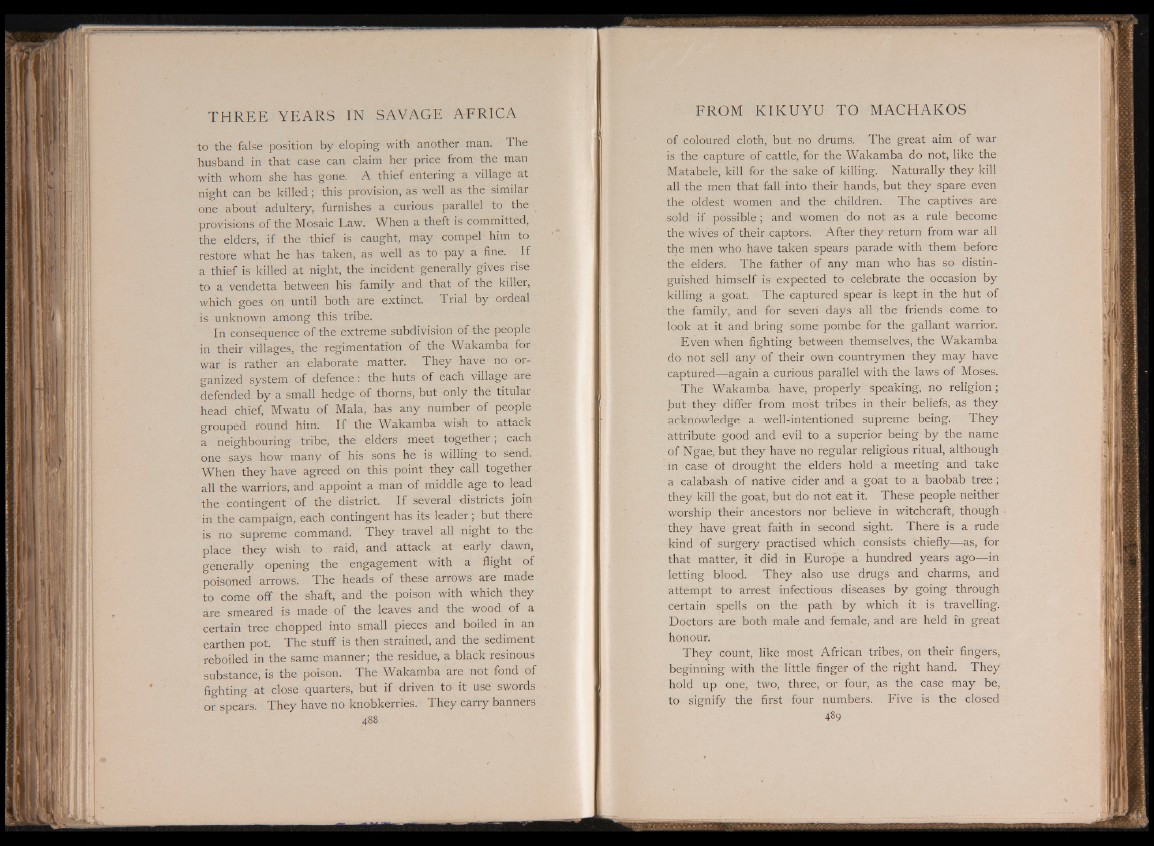
to the false position by eloping with another man. The
husband in that case can claim her price from the man
with whom she has gone. A thief entering a village at
night can be killed; this provision, as well as the similar
one about adultery, furnishes a curious parallel to the
provisions of the Mosaic Law. When a theft is committed,
the elders, if the thief is caught, may compel him to
restore what he has taken, as well as to pay a fine. If
a thief is killed at night, the incident generally gives rise
to a vendetta between his family and that of the killer,
which goes on until both are extinct. Trial by ordeal
is unknown among this tribe.
In consequence of the extreme subdivision of the people
in their villages, the regimentation of the Wakamba for
war is rather an elaborate matter. They have no organized
system of defence: the huts of each village are
defended by a small hedge- of thorns, but only the titular
head chief, Mwatu of Mala, has any number of people
grouped round him. If the Wakamba wish to attack
a neighbouring tribe, the elders meet together; each
one says how many of his sons he is willing to send.
When they have agreed on this point they call together
all the warriors, and appoint a man of middle age to lead
the contingent of the district. If several -districts join
in the campaign, each contingent has its leader; but there
is no supreme command. They travel all night to the
place they wish to raid, and attack at early dawn,
generally opening the engagement with a flight of
poisoned arrows. The heads of these arrows are made
to come off the shaft, and the poison with which they
are smeared is made of the leaves and the wood of a
certain tree chopped into small pieces and boiled in an
earthen pot. The stuff is then strained, and the sediment
reboiled in the same manner; the residue, a black resinous
substance, is the poison. The Wakamba are not fond of
fighting at close quarters, but if driven to it use swords
or spears. They have no knobkerries. They carry banners
of coloured cloth, but no drums. The great aim of war
is the capture of cattle, for the Wakamba do not, like the
Matabele, kill for the sake of killing. Naturally they kill
all the men that fall into their hands, but they spare even
the oldest women and the children. The captives are
sold if possible; and women do not as a rule become
the wives of their captors. After they return from war all
the men who have taken spears parade with them before
the elders. The father of any man who has so distinguished
himself is expected to celebrate the occasion by
killing a goat. The captured spear is kept in the hut of
the family, and for seven days all the friends come to
look at it and bring some pombe for the gallant warrior.
Even when fighting between themselves, the Wakamba
do not sell any of their own countrymen they may have
captured—again a curious parallel with the laws of Moses.
The Wakamba have, properly speaking, no religion;
but they differ from most tribes in their beliefs, as they
acknowledge a well-intentioned supreme being. They
attribute good and evil to a superior being by the name
of Ngae, but they have no regular religious ritual, although
in case of drought the elders hold a meeting and take
a calabash of native cider and a goat to a baobab tree;
they kill the goat, but do not eat it. These people neither
worship their ancestors nor believe in witchcraft, though
they have great faith in second sight. There is a rude
kind of surgery practised which consists chiefly—as, for
that matter, it did in Europe a hundred years ago—in
letting blood. They also use drugs and charms, and
attempt to arrest infectious diseases by going through
certain spells on the path by which it is travelling.
Doctors are both male and female, and are held in great
honour.
They count, like most African tribes, on their fingers,
beginning with the little finger of the right hand. They
hold up one, two, three, or four, as the case may be,
to signify the first four numbers. Five is the closed
489